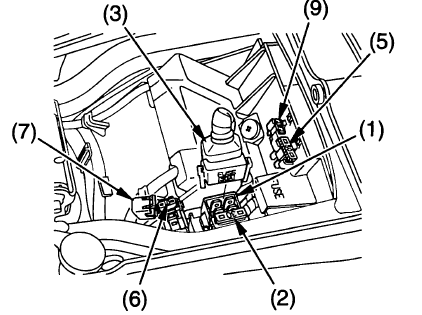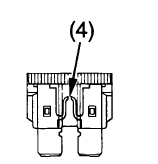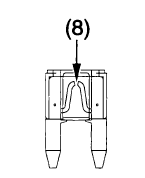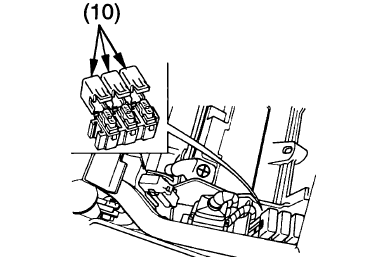 Honda CBR125RW - Owner's Manual > If Your Engine Overheats
Honda CBR125RW - Owner's Manual > If Your Engine Overheats
Normally, the needle on your temperature gauge will rise to a point about midway between C (cold) and H (hot) and then level off. Hot weather may cause the needle to rise higher than normal. So will temporary stress such as climbing a hill. If you're stuck in stop-and-go traffic, the needle may climb some, but the radiator fan is designed to prevent overheating. Be aware of these variations as you monitor the gauge.
If the needle moves toward H for no apparent reason, pull safely to the side of the road. If possible, park in a shady area.
 Continuing to ride with an
overheated engine can cause serious engine damage.
Continuing to ride with an
overheated engine can cause serious engine damage.
- A steaming engine indicates a coolant leak. Shut the engine off and wait until the steaming stops. Look for a leak, but don't touch the engine or radiator system. Let everything cool off first.
- If there's no obvious problem, leave the engine on so the fan and coolant circulating system can continue working. Monitor the temperature gauge. The needle may drop to the normal range after a brief stop with no load on the engine.
- Check the radiator fan.
If the fan is not working, turn the engine off. Open the fuse box and check the radiator fan fuse.
If the fuse is blown, replace it with the proper (same rating) spare fuse. Start the engine. If the needle climbs to the red zone and stays there, turn the engine off.
If the radiator fan is working, visually check the coolant level in the reserve tank, located behind the frame. It isn't necessary to touch the radiator system.
- If the reserve tank is low or empty, don't ride without adding coolant.
After adding coolant, turn the engine on and check the temperature gauge.
If the needle doesn't drop, do not ride.
The engine needs repair. Transport your motorcycle to a Honda dealer.
If the temperature drops to normal, check the coolant level. If it has gone down, add more coolant.
If you are able to resume riding, continue to monitor the gauge frequently.
If there's a mild leak, you can ride for awhile, carefully watching the gauge. Be prepared to stop and add more coolant or water. If the leak is bad, transport your motorcycle to a Honda dealer.
If a Fuse Blows
All of the electrical circuits on your motorcycle have fuses to protect them from damage caused by excess current flow (short circuit or overload).
If something electrical on your motorcycle stops working, the first thing you should check for is a blown fuse.
Determine from the chart on the circuit fuse box cover which fuse or fuses control that component. Check those fuses first, but check all the fuses before looking elsewhere for another possible cause of the problem. Replace any blown fuses and check component operation.
- Main fuse is located on the starter motor magnetic switch (1) under the front seat.
- Fl fuse is located under the front seat.
- The circuit fuse boxes are located behind the battery cover under the front seat.
Recommended Fuses

1. To prevent an accidental short circuit, turn the ignition switch OFF before checking or replacing the fuses.
UNDER FRONT SEAT

- starter motor magnetic switch
- main fuse
- wire connector
- spare main fuse
- FI fuse
- FI fuse cover
- spare FI fuse
Main Fuse Access:
2. Remove the front seat.
3. Lift the starter motor magnetic switch (1) slightly.
4. To access the main fuse (2), disconnect the wire connector (3) of the starter motor magnetic switch.
5. Pull the main fuse out. If it is blown (4), install the spare main fuse (5).
MAIN FUSE

- blown fuse
6. Reconnect the wire connector.
FI Fuse Access:
7. To access FI fuse (6), open the FI fuse cover (7).
8. Pull FI fuse out.
If it is blown (8), install spare FI fuse (9).
Fl FUSE

- blown fuse
9. Close the FI fuse cover.
Circuit Fuse Access:
10. Open the battery cover.
11. Open the fuse box cover (10).
UNDER FRONT SEAT

- fuse box cover
12. To check or replace a circuit fuse, pull the old fuse out. Look for a burned wire inside the fuse. If the fuse is blown (11), replace it with a spare fuse of the same rating.
If you do not have a replacement fuse with the proper rating for the circuit, install one with a lower rating.
 Replacing a fuse with one
that has a higher rating greatly increases the chance of damage to the
electrical system.
Replacing a fuse with one
that has a higher rating greatly increases the chance of damage to the
electrical system.
CIRCUIT FUSE

- blown fuse
13. Close the fuse box cover and battery cover.
14. Install the front seat.
If you do not have a spare fuse and you cannot ride the motorcycle without fixing the problem, take a fuse of the same rating or a lower rating from one of the other circuits that you can do without temporarily.
If you replace a blown fuse with a spare fuse that has a lower rating, replace the fuse with the correct rating as soon as you can. Also remember to replace any spare fuses that were installed.
If the replacement fuse of the same rating burns out in a short time, there is probably a serious electrical problem on your motorcycle. Leave the blown fuse in that circuit and have your motorcycle checked by your Honda dealer.
See also:
 Honda CBR125RW - Owner's Manual > If You Have a Flat Tire
Honda CBR125RW - Owner's Manual > If You Have a Flat Tire
A flat tire is always unwelcome, especially if you are far from help. If you think you are losing air, or you hit a pothole or hard object, pull safely to the side of the road so you can inspect the tires and assess the situation. (Be sure to park on a firm, level surface and use the side stand for support.) You should examine the tire treads and sidewalls for foreign objects or damage. If you find a tire that has been punctured or damaged, you have two options.
 Honda CBR125RW - Owner's Manual > If You Crash
Honda CBR125RW - Owner's Manual > If You Crash
Personal safety is your first priority after any accident. If you or anyone else has been injured, take time to assess the severity of the injuries and whether it is safe to continue riding. Call for emergency assistance if needed. Also follow applicable laws and regulations if another person or vehicle is involved in the accident.

 BMW G310GS
BMW G310GS Honda CBR125RW
Honda CBR125RW Husqvarna 401 Vitpilen
Husqvarna 401 Vitpilen KTM 890 Duke R
KTM 890 Duke R Mash Dirt Track 650
Mash Dirt Track 650 Peugeot Kisbee
Peugeot Kisbee Yamaha Tracer MT-09
Yamaha Tracer MT-09 Honda CBR125RW
Honda CBR125RW Peugeot Kisbee
Peugeot Kisbee Yamaha Tracer MT-09
Yamaha Tracer MT-09